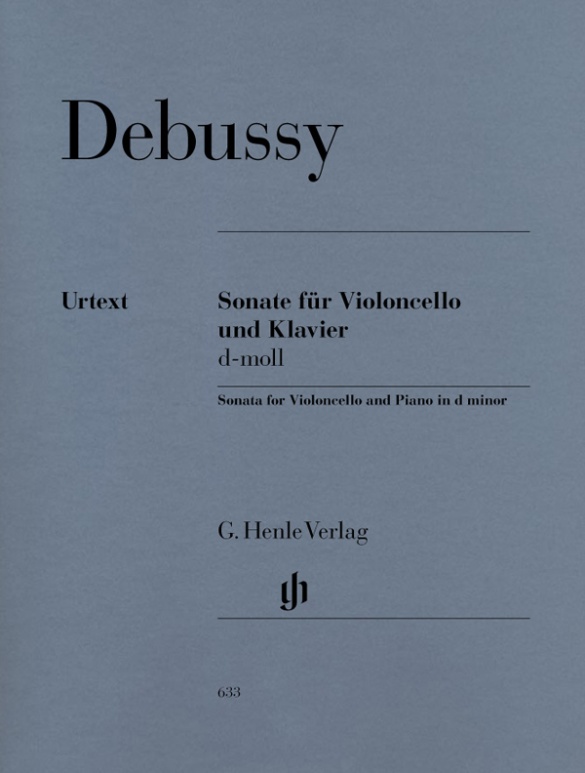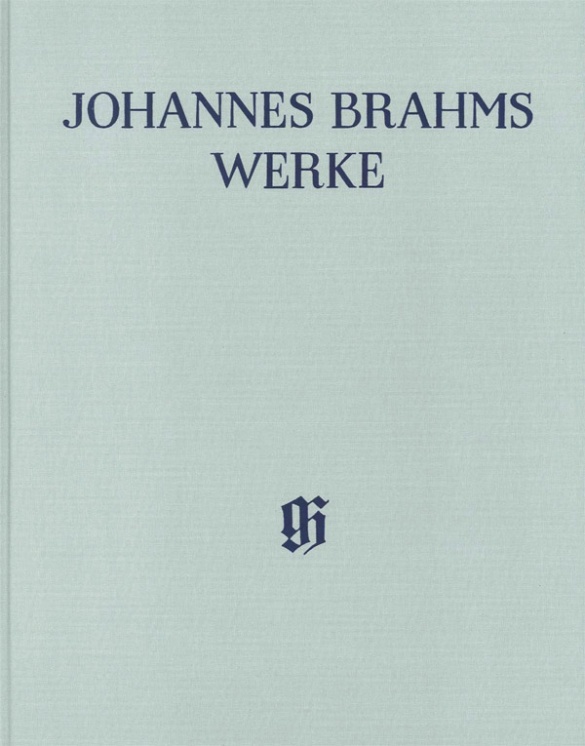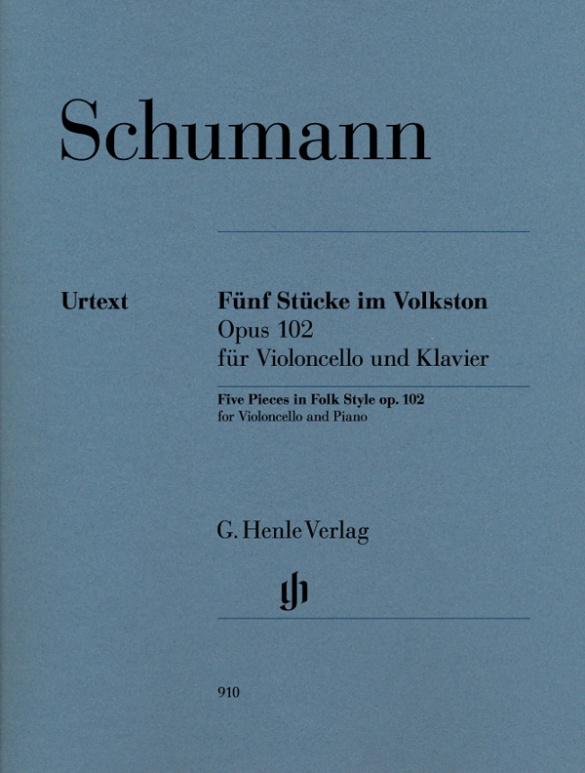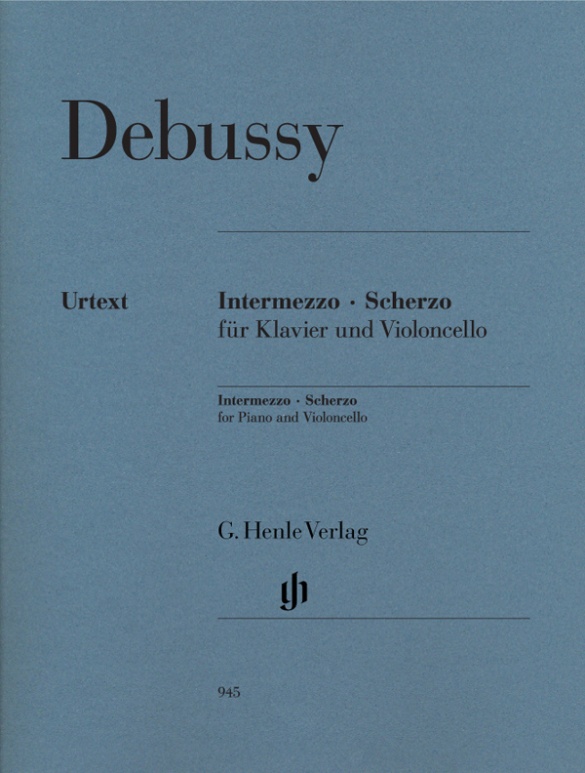

Claude Debussy
Intermezzo · Scherzo
Tous les violoncellistes connaissent bien cette Sonate de Debussy, composée en 1915 seulement, trois ans avant la mort du compositeur. Mais dès 1882 – il avait alors tout juste 20 ans –, celui-ci avait déjà écrit deux œuvres pour violoncelle et piano. Elles sont restées longtemps pratiquement ignorées du public, car l’autographe de l’«Intermezzo» – l’unique source de cette œuvre – est resté plusieurs dizaines d’années inaccessible. Aujourd’hui, les Editions Henle sont dans l’heureuse situation de pouvoir présenter une édition Urtext de l’«Intermezzo», complétée par «Scherzo», parue à titre posthume en 1995. Jeffrey Solow (violoncelle) et Eckart Sellheim (piano) se sont chargés d’aporter respectivement les coups d’archet et les doigtés.
CONTENU/DÉTAILS
CONCERNANT LE COMPOSITEUR
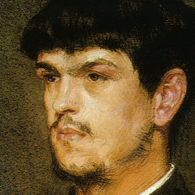
Claude Debussy
Le plus important compositeur français autour de 1900 dont la musique fondamentalement dominée par le timbre présente de profondes innovations. Son œuvre est en étroite relation avec le mouvement symboliste.
| 1862 | Né le 22 août à Saint-Germain-en-Laye. |
| 1872–84 | Études au Conservatoire de Paris. À cette époque voyages en Suisse, en Italie, à Vienne et en Russie avec la famille de Nadejda von Meck où il découvre la musique russe ainsi que la musique tzigane. |
| 1884 | Il remporte le Prix de Rome avec sa cantate «L’Enfant prodigue». Puis séjour à Rome jusqu’en 1887. |
| 1887–89 | Mélodies «Cinq Poèmes de Baudelaire». |
| 1888/89 | Séjour au Festival de Bayreuth; écrit sur Wagner. |
| 1889 | Exposition universelle de Paris où il découvre la musique de l’Extrême-Orient qui influence son style. |
| 1890 | Contact avec Mallarmé et son cercle. |
| 1891/1903 | «Fêtes galantes» série de mélodies d’après Verlaine. |
| 1891–94 | Œuvre pour orchestre «Prélude à l’après-midi d’un faune» avec des mélodies tout en arabesques. |
| 1897–99 | Nocturnes pour orchestre et voix de femmes. |
| 1901 | Début de son activité en tant que critique musical. |
| 1902 | Exécution de l’opéra « Pelléas et Mélisande» d’après le drame symboliste de Maeterlinck qui marque une rupture en dépit de la critique. |
| 1903–05 | Page orchestrale «La Mer» aux principes symphoniques et un langage musical «impressionniste». |
| 1905–07 | 1er et 2e cahiers des «Images» pour piano. |
| 1906–08 | «Children’s Corner», pièces enfantines pour piano. |
| 1909–10/11–13 | 1er et 2e livres des «Préludes» pour piano; les titres programmatiques des pièces, au caractère parfois très ésotérique, viennent à la fin. |
| 1913 | Mélodies «Trois poèmes de Stéphane Mallarmé». |
| 1915–17 | Sonates de musique de chambre recourant à la tradition française du XVIIIe s. |
| 1918 | Meurt à Paris le 25 mars. |
About the Authors
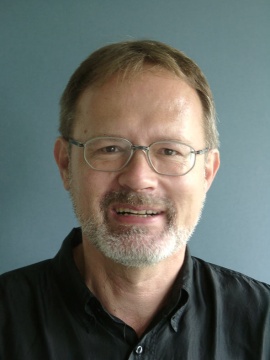
Ernst-Günter Heinemann (Editeur)
Dr. Ernst-Günter Heinemann, born in 1945 in Bad Marienberg (Westerwald), completed his schooling in Gießen and read musicology, philosophy and German in Marburg and Frankfurt/Main and also for some time Protestant church music. He did his doctorate on “Franz Liszts geistliche Musik. Zum Konflikt von Kunst und Engagement”.
From 1978–2010 Heinemann worked as an editor at G. Henle Publishers (in 1978 in Duisburg, from 1979 onwards in Munich). He edited a great many Urtext editions for the publishing house, including “Das Wohltemperierte Klavier”, Volume 1 by Bach and all of Debussy’s piano works. In addition, he wrote essays on Debussy, Grieg, Liszt, Mendelssohn and questions concerning general editing, as well as giving seminars on editorial practice for musicology students in Munich.
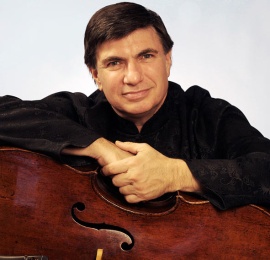
Jeffrey Solow (Doigtés violoncelle)
Prof. Jeffrey Solow was born in Los Angeles; he earned a degree in Philosophy “magna cum laude” from UCLA while studying violoncello with and then assisting the legendary Gregor Piatigorsky.
Solow has toured throughout North America, Europe, Latin America and Asia as a recitalist, soloist, chamber musician and teacher. Solow performed more than 40 works with orchestras throughout the United States, in Europe and in Asia and he has been guest artist at many national and international chamber music festivals. Among his many recordings two have received Grammy Award nominations. “Strad”, “Strings”, and “American String Teacher” magazines have published his articles and reviews, he is president of Violoncello Society, Inc. of New York and is a past president of the American String Teachers Association. Jeffrey Solow is professor of cello at Temple University in Philadelphia.
© Photo: Patrick Snook
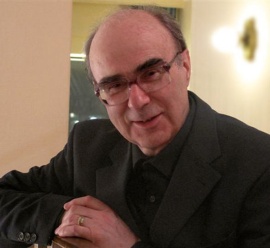
Eckart Sellheim (Doigtés piano)
Prof. Eckart Sellheim received his education in Germany and Switzerland, including with Adolf Drescher and Jakob Gimpel. After teaching for many years in Cologne and Ann Arbor, Michigan (USA) from 1989 to 2008 he was Professor and “Director of Collaborative Piano” at Arizona State University in Tempe (USA) as well as a lecturer/teacher of fortepiano at the music conservatory in Trossingen until summer 2006. He has given numerous master-classes in piano, chamber music, lied accompaniment, fortepiano and historical performance practice in Europe and the USA, and is a jury member at international music competitions. He has toured around Europe, America, Latin America, the Caribbean, the Middle East and Africa.
Sellheim’s recordings can regularly be heard on the radio in Germany and America; his discography encompasses more than 30 recordings as a soloist, lied accompanist and chamber musician, many of which were for CBS Sony with his brother and long-term duo partner, the cellist Friedrich-Jürgen Sellheim.
© Photo: Charly Leske
Informations sur la sécurité du produit

G. Henle Verlag
Vous trouverez ici des informations sur le fabricant du produit.G. Henle Verlag e.K.
Forstenrieder Allee 122
81476 München
Allemagne
info@henle.de
www.henle.com
Meticulously edited by Jeffrey Solow, cellists will be delighted to discover these unfamiliar works.
Stringendo, 2011recommandations
autogenerated_cross_selling
Autres éditions de ce titre


